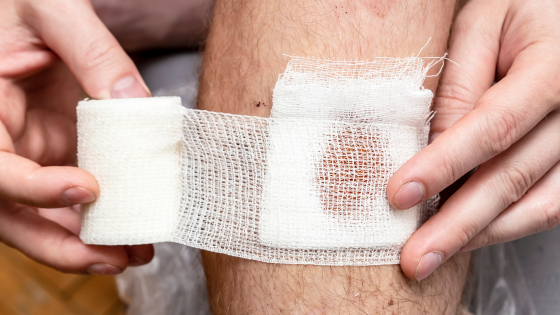Learn more about wound care at home and how professional support can improve your healing and maintain your independence.
Caring for wounds at home is essential for promoting healing and preventing complications. For many seniors or their family members, the idea of recovering from a wound often comes with the assumption that facility-based care is the only option. But the truth is, most wounds can be effectively managed at home with the right level of support.
Still, wound care isn’t as simple as just changing a bandage. Wounds heal in stages, and what works at one point in the healing process may not be effective later on. Without proper care, even minor wounds can turn into major complications, especially for seniors who may have slower healing times.
That’s where in-home professional wound care comes in. With the support of a concierge nursing team like Navigate Wellness, you can get high-quality, expert-level wound care without giving up your independence.
Ready to learn more about how to manage wound care at home? Keep reading for our expert tips.
Understanding Wound Care At Home
Wound care is the process of cleaning, treating, and protecting an injury to promote healing and prevent infection. Whether a wound is the result of surgery, an accident, or a chronic condition, proper care is essential to avoid complications like delayed healing or infections.
The body’s natural healing process includes several stages, including stopping bleeding, rebuilding tissue, and closing the wound. However, certain wounds need careful management to heal properly. Factors like age, underlying health conditions (such as diabetes or poor circulation), and the wound’s size and depth can all impact healing.
Because of this, safely managing at-home wound care requires:
- Knowing how to clean the wound properly
- Choosing the right type of dressing
- Watching for signs of infection
For many seniors, or those recovering from surgery, professional wound care at home can make a significant difference in both comfort and recovery time.

Types of Wound Care at Home
Not all wounds are the same, and different types require different care approaches. Whether you’re dealing with a minor cut or a post-surgical incision, understanding the best practices for each type of wound can make a huge difference in healing.
Wound Care at Home After Surgery
Surgical wounds require extra attention to prevent infection and ensure the incision heals properly. Basic steps include:
- Keeping the wound clean and dry to prevent bacterial growth
- Changing dressings as directed by your doctor or nurse
- Watching for signs of infection like redness, swelling, or discharge
- Avoiding unnecessary movement that could put strain on stitches or sutures
A professional in-home nurse can help with wound inspections, dressing changes, and identifying complications before they become serious.
Chronic Wound Care
Some wounds don’t heal as quickly as they should, often due to underlying conditions like diabetes or poor circulation. These chronic wounds, such as pressure ulcers or diabetic foot sores, require ongoing management to prevent infection and tissue damage.
Wound care nurses use special dressings, assess blood flow to the area, and provide personalized strategies to help wounds heal more effectively.
Minor Cuts, Scrapes, and Burns
For small wounds, basic care involves cleaning, applying antibiotic ointment, and covering with a clean bandage. Keeping the wound covered helps prevent infection and speeds up healing. While most minor wounds heal on their own, deeper cuts or burns may require medical attention.
Pressure Ulcer (Bed Sore) Management
For seniors or individuals with limited mobility, pressure ulcers—also known as bed sores—can develop from prolonged periods of sitting or lying down. These wounds need careful monitoring and treatment, including:
- Regular repositioning to relieve pressure
- Keeping the skin clean and dry
- Using special dressings to promote healing and prevent infection
Infected Wound Care
If a wound becomes infected, treatment becomes even more complex. Signs of infection include redness, warmth, swelling, pus, or an unpleasant odor. Infected wounds require immediate attention to prevent worsening complications.
A skilled nurse can assess the infection, clean the wound properly, and coordinate with a doctor for any necessary antibiotics or advanced wound treatments.
When you work with Navigate Wellness, our care navigation team can also help ensure all of your healthcare professionals are updated on your progress and any issues you may experience while healing.

When to Get Professional Help With Wound Care
While basic wound care for simple cuts and bruises can often be managed at home by a family member or home health aide, certain situations require professional intervention from a skilled nurse.
If you’re dealing with any of these wounds, it’s important to reach out to a wound care professional:
- Complex Wounds or Wounds That Won’t Heal: Chronic wounds, such as pressure ulcers or diabetic foot ulcers, often require specialized care to promote healing and prevent infection.
- Wound Care After Surgery: Proper management of surgical wounds is crucial to prevent complications like infections or dehiscence (wound reopening).
- Conditions That Impact Wound Healing: Individuals with conditions like diabetes or peripheral vascular disease may have impaired healing, necessitating expert care.
Wound Care at Home vs. Wound Care Facility
While professional support is often necessary for proper wound care, it doesn’t mean your only option is to receive care in a facility, such as a skilled nursing center, hospital, or rehabilitation unit.
But for many seniors, that’s exactly what happens when they need wound care support. Unfortunately, going to a facility means giving up the comfort and independence of home just to receive a specific type of wound management.
In reality, wound care can often be effectively managed at home with the right expertise. Receiving wound care support at home comes with a whole host of benefits – even beyond the wound itself.
Wound Care In a Nursing Facility
A skilled nursing facility provides a variety of services, from wound care to rehabilitation to general medical oversight. But when a patient only needs wound care, everything else becomes an unnecessary—and sometimes unwanted—addition.
You might experience:
- Loss of Independence: Moving to a facility means giving up daily comforts like sleeping in your own bed, eating home-cooked meals, and spending time with family on your terms.
- One-Size-Fits-All Care: Facilities have structured care plans that don’t always align with an individual’s specific needs or preferences.
- Potential for Exposure: With multiple residents in a shared environment, there’s an increased risk of exposure to infections and hospital-acquired conditions.
For seniors, especially those who are otherwise independent, going to a facility just for wound care can feel like a major disruption to their lives – and can even lead to bigger problems down the road. The costs of getting wound care in a facility can also be overwhelming for many seniors and their families.

The Benefits of Wound Care at Home
At-home wound care, on the other hand, provides a patient-centered alternative that allows individuals to receive expert care while maintaining their lifestyle. This approach ensures:
- Personalized Treatment Plans: At Navigate Wellness, we tailor every care plan to the individual—adjusting for their specific wound type, healing stage, and any other health concerns.
- Expert-Level Monitoring: Wound healing is not a linear process. Some wounds change frequently, requiring adjustments in treatment. Our team includes a skilled Wound Care Nurse trained to recognize these subtle shifts and make the necessary modifications.
- Collaboration with Specialists: Effective wound care often requires coordination with wound specialists, physicians, and other healthcare providers. Our Care Navigators ensure seamless communication to optimize healing outcomes.
- Reduced Physical and Emotional Stress: Staying at home reduces the stress and fatigue that can come with facility-based care, allowing for a more relaxed and healing-focused environment.
Wound care isn’t just a technical process—it’s also an art. Every wound is different, and proper care requires diligence, follow-up, and a skilled provider who understands how wounds evolve. With at-home care from Navigate Wellness, patients don’t have to choose between high-quality medical treatment and their personal comfort. They get both.
If you or a loved one needs professional wound care without the hassle of a facility stay, contact Navigate Wellness today to learn how our concierge nursing services can provide expert care in the place you feel most comfortable—home.
Take the Next Step Towards Expert Wound Care at Home
Don’t let wound care challenges compromise your quality of life. If you or a loved one needs professional wound care without the hassle of a facility stay, contact Navigate Wellness today to learn how our Columbia, MO wound management services can support your healing journey.
Our compassionate team is ready to provide the expert care you deserve, right in the comfort of your home.




